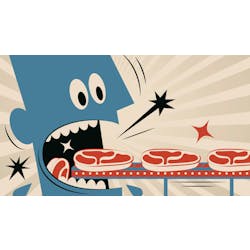Dear Dianne,
Two weeks ago, I experienced the worst day of my life. My boss fired me.
I came to this practice five years ago straight out of hygiene school. For the most part, I have been happy. However, there have been some difficult times along the way. For example, my child has had numerous illnesses that have required my presence at home. Additionally, I have had some health problems of my own. I am not always able to schedule my medical appointments on my day off. The doctor just doesn't seem to care about my problems.
I thought I had a good working relationship with my doctor, and I never dreamed he would fire me. I am so devastated emotionally that I am considering leaving the profession. How can I work in a profession that does not allow me or my child to be sick? It seems my loyalty and hard work was unappreciated, and being fired is my reward. I wonder if the real reason he fired me is because he felt he was paying me too much money.
In addition, I am worried about getting another position. How can I ever tell a prospective employer that I was fired from my last position? Can you give me any words of encouragement?
Devastated in Denver
Dear Devastated,
First, let me extend my condolences to you in the loss of your job. Being terminated from a job can wreak havoc with your self-esteem and sense of self-worth. It feels like having the wind knocked out of you, especially when it comes unexpectedly.
Obviously, you are experiencing some very negative emotions - anger, resentment, hurt feelings, a sense of betrayal, and shock. These are all very natural reactions to this unfortunate event in your life. What I hope to do is to help you work past the negativity and emerge stronger and wiser.
There are many unanswered questions in your particular situation. You stated you had worked in this practice for five years. I would assume that the doctor felt your job performance was at least adequate, or he would have made a staff change earlier. Has your absenteeism become a problem over the last few months, or has it been an ongoing problem?
Has the doctor ever taken you aside privately and discussed any concerns with absenteeism or any other problem relating to your job performance in the past? Has the doctor ever related any patient complaints to you? Do you get along well with your co-workers, or have there been skirmishes along the way?
I can tell you from consulting with many practices over the years that most doctors do not relish the thought of having to fire a staff member. I have known doctors to approach the situation with much angst and even lose sleep prior to a termination. Here are the most common causes of employer dissatisfaction resulting in termination:
- Absenteeism
- Patient complaints
- Inability to get along with co-workers
- Poor job performance
- Not being a team player
- Tardiness
- Disloyalty
- Making disparaging remarks about the quality of the doctor's work
You probably noticed that the number-one reason for termination is absenteeism. Dental hygienists are in a particularly tough position when they have to be absent. The practice suffers financially when hygiene patients have to be cancelled. Patients become irate at having their appointment cancelled, whatever the reason. This is especially true in busy practices with full schedules and no time to reschedule patients.
However, it is a fact that we all experience illness at some time in our lives. Dental practices that have no back-up plans to carry on when a staff member has to be absent are stress-filled and difficult to manage. The best plan of action is to have a list of hygienists that are available to work on short notice so that appointments do not have to be cancelled. Additionally, doctors should be willing to pay a substitute hygienist a higher rate of pay for their services, as they are paying for their skill and availability. Substitute hygienists often drop everything and change their plans for the day to help practices maintain the schedule. It is very unwise from a business standpoint for a doctor to refuse to pay even a mere $10 to $20 per day increase over the regular hygienist's salary, but I have seen it happen. I believe that is called "stepping over dollars to pick up dimes ..."
It is my feeling that if the hygienist knows ahead of time that she or he will need to be absent, the hygienist should accept part of the responsibility in finding a replacement, or at least assist in the task of rescheduling those patients. Even agreeing to open up another day (if that is possible) where patients can be moved can lighten the rescheduling burden tremendously. In addition, when children are involved, it is our responsibility to obtain suitable childcare. Even mildly sick children tug at our heartstrings and convince us that we should stay home when they would have fared just fine in someone else's care.
The bottom line is that when we become dental hygienists, we must accept the responsibility that we work on a schedule, that many people are affected by changes to that schedule, and our absenteeism must be kept to a minimum. Otherwise, the practice suffers and patients are not served in a timely manner.
I would ask you to try to put yourself in your employer's position. If you owned the practice and had a staff member who was frequently absent, making everyone else's job more difficult and stressful, what would you do?
I also will attest that some doctors are inflexible and unrealistic in their expectations of their staff members. One doctor related to me that he "does not allow his staff members to be absent" and that he tells them this when he hires them. Needless to say, the practice suffers from low staff morale and high turnover. These doctors are always looking for that "perfect" staff member, when the reality is that no such person exists.
What I urge you to do is put aside all those negative feelings you have and learn and grow from this experience. Understand that your place in the practice is to be the best dental hygienist possible. Being the best means providing excellent professional care to your patients. You cannot do that if you are not there. Being the best also means taking responsibility for your job and not expecting other people to solve or even understand your problems.
You will survive this. In fact, I expect you will be able to find another position in due time that could prove to be even better than your last position. There is no reason to dread a future interview. Just be honest with any prospective employer and relate that your child (and you) went through a period of unfortunate illness, but that now has been resolved.
The worst thing you can do is to harbor negative feelings and allow them to take firm root in your heart and mind. Put this in your past, and don't rehash it with co-workers or others, as reliving it interferes with healing. You were knocked down. It's time to get up, dust yourself off, and move on. Moreover, if you love dental hygiene and helping people, please don't leave the profession! We need good hygienists like you!
Dianne
Dianne D. Glasscoe, RDH, BS, is a professional speaker, writer, and consultant to dental practices across the United States. She is CEO of Professional Dental Management, based in Lexington, N.C. To contact Glasscoe for speaking or consulting, call (336) 472-3515, fax (336) 472-5567, or email [email protected]. Visit her Web site at www.profession aldentalmgmt.com.




